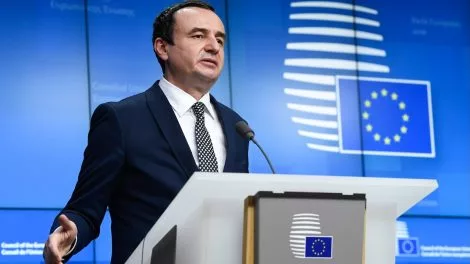The EU’s poor record in the Western Balkans over the past decade does not bode well for further enlargement. As we remember the success of 2004, it’s time to remember that the EU once openly embraced a large part of the European continent. It can do so again.
On May 1, 2004, the European Union embarked on perhaps its most ambitious ever endeavour: the largest single expansion in its history, welcoming ten new member states, primarily from Central and Eastern Europe.
Such an enlargement—at least in one full swoop—is unlikely to ever take place again.
- Armenia should support regional cooperation to back its European integration
- Rethinking how to communicate EU enlargement in a year of multiple elections
- What can the EU do about its Viktor Orbán problem?
This historic enlargement incorporated Czechia, Estonia, Hungary, Latvia, Lithuania, , Poland, Slovakia, and Slovenia into the EU. Cyprus and Malta also become EU members. The event was not just a political milestone but also a transformative economic and social reform process aimed at unifying a continent once divided by the Cold War.
Nearly two decades on, the success of the 2004 enlargement is almost undisputable. Every country that formed part of the 2004 cohort is considerably richer, and—with one notable exception—freer. The EU has brought wealth, it has consolidated democracy, and has helped to disseminate progressive values.
It’s no wonder that the queue to join the EU is long and looks set to grow even longer this year with Armenia’s application reportedly imminent.
An economic success story
The economic implications of the 2004 EU expansion have been profound for both the new member states and the bloc as a whole.
As a result of what was officially termed the fifth enlargement, the number of EU member states increased overnight from 15 to 25, the number of official languages from 11 to 21, while the bloc’s population increased by 75 million.
Part of the same wave of enlargement was the accession in 2007 of Bulgaria and Romania, who were unable to join in 2004 due to concerns over rule of law and corruption, but which, according to the European Commission, constitute part of the fifth enlargement.
Initially, these countries faced significant economic disparities compared to their Western counterparts, characterized by lower GDP per capita and industrial output.
However, integration into the EU brought extensive benefits through several channels, most notably increased investment, access to a larger market, and substantial structural and cohesion funds from the EU budget.
The results were quickly apparent. Countries like Poland and Slovakia experienced rapid economic growth, outpacing the growth rates of long-standing EU members. For instance, from 2004 to 2019, Poland’s GDP more than doubled, supported by EU funds that contributed to infrastructure projects, enhancing both rural and urban development. The EU’s cohesion policy, aimed at reducing economic and social disparities, has been instrumental in this growth. These funds have been utilised in constructing highways, modernising railways, improving rural connectivity, and supporting various economic initiatives that have collectively boosted regional economies.
Perhaps the most significant economic achievement of the 2004 EU expansion has been the extension and successful integration of the single market. By incorporating so many new member states, the EU not only grew its geographic and demographic footprint but also created the world’s largest and most successful single market, featuring over half a billion consumers and 21 million businesses.
This expansion has facilitated unprecedented levels of trade and economic cooperation, removing barriers to the free movement of goods, services, capital, and labour.
The single market has allowed businesses to scale up efficiently and effectively across the continent, fostering competitiveness and innovation. This is evident in the growth of Central and Eastern European firms that have expanded beyond their national borders, leveraging the single market’s scale and scope for growth and innovation.
The EU’s limitations
One of the fundamental aims of the EU has always been to support and stabilise democratic governance in its member states.
The fifth enlargement was particularly significant in this regard, as it included nations still transitioning from decades of communist rule. The EU has played a crucial role in fostering democratic institutions and practices in these countries through stringent adherence to the Copenhagen criteria (the rules that define whether a country is eligible to join the European Union), which include stable institutions guaranteeing democracy, the rule of law, human rights, and respect for and protection of minorities.
The subsequent impact on democracy in these countries has been largely positive, with improvements in judicial reforms, anti-corruption measures, and civil society development notable.
However, challenges remain, such as concerns over judicial independence and media freedom in some states, particularly Hungary. Here, the democratic backsliding brought about by the Viktor Orbán government has highlighted some of the EU’s limitations.
Brussels has been largely powerless to prevent the Fidesz government passing anti-migrant and anti-LGBT+ policies, as well as laws that hamper the operations of opposition groups, journalists, universities, and nongovernmental organisations (NGOs) that are critical of the ruling party or whose perspectives Fidesz otherwise finds unfavourable.
The country has for some years been classes by Freedom House, which monitors democracy across the world, as only ‘partly free’. It is the only EU member state not classed as a consolidated or semi-consolidated democracy, instead finding itself bracketed with EU hopefuls in the Caucasus and Western Balkans as a ‘Transitional or Hybrid’ regime.
Beyond withholding some funding however there is little that the EU can do to bring errant member states onside. There is, famously, a mechanism that allows member states to leave the EU of their own accord (Article 50—see Brexit) but none which allows Brussels to kick out a state that no longer adheres to its values.
Until such a mechanism exists (and some member states are keen to see one introduced, even though it would require rewriting the EU’s constitution) there is likely to be any real enthusiasm for further enlargement.
An alternative to Russia
This is a shame, for the EU currently has a window of opportunity that may not be open for long. Russia’s invasion of Ukraine has changed the geopolitical landscape, making the inclusion of countries from Albania to Armenia not just a timely consideration but an imperative strategic move.
Europe’s historical backdrop, characterised by shifting borders and conflicts, particularly in its eastern territories, underscores the need for a stable and unified continent.
Countries like Ukraine and Georgia are of immense strategic importance. Their integration into the EU could serve as a bulwark against instability, enhancing the security landscape across the continent.
Moreover, the region’s role in global energy dynamics cannot be understated. As the EU seeks alternatives to reduce its energy dependency on Russia, these countries’ roles as transit hubs for pipelines are invaluable. This integration not only promises greater energy security but also fortifies the EU’s strategic autonomy by diversifying its energy sources.
More than anything else, however, the EU offers a counterbalance to Russia’s influence in Eastern Europe. By integrating countries that historically leant towards Moscow (Armenia is the latest to pivot), the EU can present an alternative that aligns more closely with Western values and economic systems.
But for that to become more than rhetoric, the EU needs to act now. Its hitherto poor record in the Western Balkans (five countries from the Western Balkans have candidate status but progress on negotiations—or even launching negotiations—has been slow) does not bode well for further enlargement, despite the speed and enthusiasm with which Georgia, Moldova and Ukraine were granted candidate status over the past couple of years.
The success of 2004 needs to drive a new wave of expansion. It should inspire confidence and act as a compelling catalyst for embracing new EU members.
Photo by Sasha Pleshco on Unsplash.
Unlike many news and information platforms, Emerging Europe is free to read, and always will be. There is no paywall here. We are independent, not affiliated with nor representing any political party or business organisation. We want the very best for emerging Europe, nothing more, nothing less. Your support will help us continue to spread the word about this amazing region.
You can contribute here. Thank you.

Published by: emerging-europe.com




